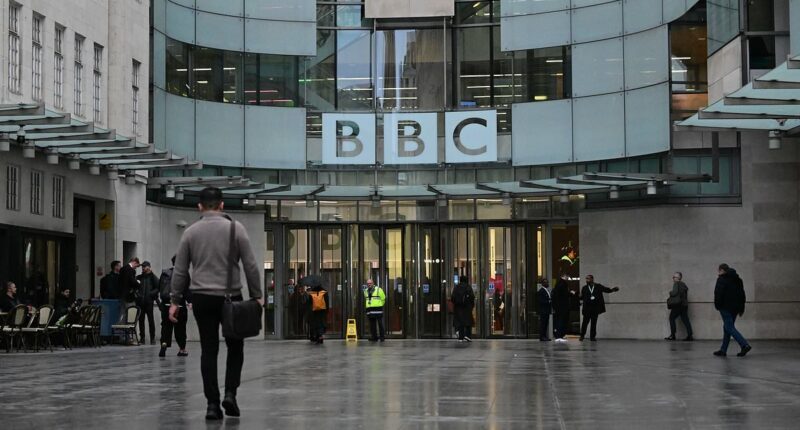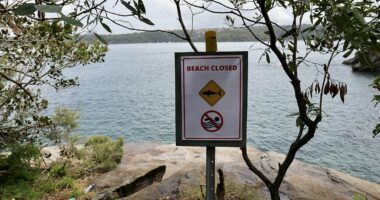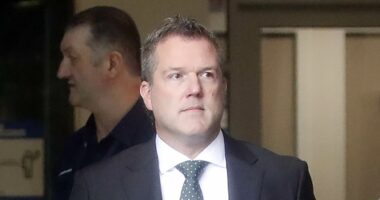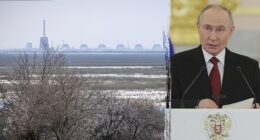Share this @internewscast.com
The BBC suffered a financial blow exceeding £1 billion last year, as an unprecedented one in eight households opted out of paying the licence fee.
Altogether, 3.6 million households declared they did not possess a licence because they chose not to utilize the BBC’s offerings.
This figure represents an increase of 300,000 from the previous year, culminating in a £617 million revenue shortfall, as highlighted by a Commons Public Accounts Committee (PAC) report.
Recent controversies have plagued the BBC, culminating in the resignation of former director-general Sir Tim Davie, who provided testimony for the PAC report.
Earlier in the month, it was revealed that Panorama had altered footage of a Donald Trump speech, making it appear as if he had incited supporters to ‘fight’ during the Capitol riots.
The PAC report also uncovered that 2.9 million BBC viewers avoided the £174.50 annual fee, depriving the broadcaster of £550 million in potential revenue.
The BBC increased visits to unlicensed households by 50 per cent, but this did not result in higher licence sales or more prosecutions.
‘Prosecutions fell by 17 per cent in the year to December 2024 compared to the year before, continuing a long-term decline since 2017,’ the report said.

The BBC lost more £1.1billion last year as a record one in eight households refuse to pay the licence fee (stock image)

The BBC’s director-general Tim Davie (pictured in January) resigned amid a row over the doctoring of a Donald Trump speech for a Panorama episode
The report added that the BBC is ‘not doing enough to enforce collection of the licence fee, which is unfair to the vast majority of households who do pay for a licence’.
It said: ‘Without visible enforcement, licence fee payers who do comply may start to question the fairness of the system.’
The BBC said that it has ‘become harder to get people to answer their doors’ compared to five years ago ‘which limits the enforcement effectiveness’.
The corporation spent £166million, 4.3 per cent of its entire income, on collecting the licence fee.
The report said the BBC has ‘not adopted opportunities to digitise the licence fee’ resulting in ‘missed opportunities for cost efficiency and more customer engagement’.
It found that around 40 per cent of households receive a paper licence by default, but the BBC has ‘not set any target to increase take-up of paperless licences’.
The report also said that BBC’s mission to ‘serve all audiences’ is at ‘risk as younger audiences choose other media providers’ while the corporation’s ‘digital first strategy could risk alienating non digital audiences’.
It said: ‘As younger viewers turn to other platforms and older or less digitally connected audiences risk being left behind, the BBC’s ability to serve all audiences, a core part of its public mission, is under pressure’
The PAC also highlighted how the BBC does not provide clear information about its commercial investments, targets and actual returns from its commercial activities, and said it should begin to provide annual reports on this.
Issues with regional services were also cause for concern, and it said the BBC should clearly communicate how it will ensure better representation of local communities ‘to sustain trust and relevance in the future’.
It said PAC members were ‘concerned that decisions labelled as “local2, such as moving operations to Manchester or Birmingham, risk overlooking the identity and needs of smaller communities’.
Reforms such as the restructuring of regional news hubs and changes to the local democracy reporting service ‘may have unintentionally diluted the BBC’s connection with the communities it aims to serve’, it added.
The corporation’s funding model is set to be looked at the upcoming Charter Review as it competes with streaming services.
The report did say that the BBC is a ‘trusted institution’ but its relevance across the UK is ‘under pressure’.
This is despite the corporation recently coming under pressure after being accused anti-Donald Trump bias.
Mr Trump threatened to sue the broadcaster for up to $5billion for its editing of a speech he made in 2021 on the day his supporters overran the Capitol.
The corporation apologised for the speech edit, which it said gave the ‘mistaken impression that President Trump had made a direct call for violent action’ on the day of the US Capitol attack on January 6, 2021.
The broadcaster said the splicing of the speech was an ‘error of judgment’ but refused to pay financial compensation, after the US president’s lawyers threatened to sue for $1billion in damages unless a retraction and apology were published.
In an episode broadcast in June 2022, Newsnight reportedly played an edit of his speech which was similar to the one used in the Panorama programme.
The PAC report also highlighted how the BBC is behind target in developing new intellectual property (IP), ‘which in turn will limit sustainable long-term revenue streams’.
Naming children’s TV series Bluey as an example of ‘the commercial value this can bring’, it said the BBC should set out how it will prioritise generating new IP.
The report said just 51 per cent of younger people feel the BBC reflects them, while their overall use of BBC services – including TV, radio or online – is significantly lower than other age groups.
‘With audiences now able to access an unprecedented range of content from a variety of providers, the BBC faces intense competition for attention’, the report said.
‘Its digital-first strategy is an important response and there are promising signs of innovation, such as using platforms like TikTok to share news content with new demographics.
‘However, this shift also carries a risk: those without reliable digital access could find themselves excluded from core BBC services.’
PAC chairman Conservative MP Sir Geoffrey Clifton-Brown said: ‘The BBC is an organisation under severe pressure.
‘Its own founding aspiration to be a truly universal broadcaster reflecting all its viewers means that this pressure, from both within and without, is inherent in its mission.
‘Our report offers a snapshot of the BBC’s efforts to deliver value for money as it seeks to thrive in an increasingly fragmented media landscape and illustrates the tensions it must navigate in multiple areas of its business – in efficiently collecting the licence fee; in providing that universal service; in staying relevant to its audiences.
‘On the licence fee, our report makes clear that the ground is shifting beneath the BBC’s feet – the traditional enforcement method of household visits is seeing fewer and fewer returns at a time of heightened competition for almost every aspect of the BBC’s activities.
‘Our report shows that without a modernised approach focused more on online viewing, the broadcaster will see faith in the licence fee system ebb away.
‘Similarly, while efforts to distribute itself more equitably across the nation are welcome in principle, the BBC must ensure that greater distribution does not equal greater dilution of the authentic local quality of its coverage.’
A BBC spokesperson said: ‘As was made clear in the committee session, the licence fee needs reform.
‘We are actively exploring all options that can make our funding model fairer, more modern and more sustainable, but we’ve been clear that any reform must safeguard the BBC as a universal public broadcaster.
‘We look forward to engaging with government, Parliament and the public on the next charter to secure the long-term future of a publicly funded BBC that serves and delivers for everyone.
‘In terms of the current funding model, TV Licensing works hard to collect the licence fee and enforce the law efficiently, fairly and proportionately and we are audited on this each year. The National Audit Office reports that we continue to successfully deliver on these measures.
‘We thank the committee for its report and will respond to the recommendations in full when we provide our formal response.’















